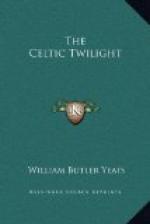A COWARD
One day I was at the house of my friend the strong farmer, who lives beyond Ben Bulben and Cope’s mountain, and met there a young lad who seemed to be disliked by the two daughters. I asked why they disliked him, and was; told he was a coward. This interested me, for some whom robust children of nature take to be cowards are but men and women with a nervous system too finely made for their life and work. I looked at the lad; but no, that pink-and-white face and strong body had nothing of undue sensibility. After a little he told me his story. He had lived a wild and reckless life, until one day, two years before, he was coming home late at night, and suddenly fell himself sinking in, as it were, upon the ghostly world. For a moment he saw the face of a dead brother rise up before him, and then he turned and ran. He did not stop till he came to a cottage nearly a mile down the road. He flung himself against the door with so much of violence that he broke the thick wooden bolt and fell upon the floor. From that day he gave up his wild life, but was a hopeless coward. Nothing could ever bring him to look, either by day or night, upon the spot where he had seen the face, and he often went two miles round to avoid it; nor could, he said, “the prettiest girl in the country” persuade him to see her home after a party if he were alone. He feared everything, for he had looked at the face no man can see unchanged-the imponderable face of a spirit.
THE THREE O’BYRNES AND THE EVIL FAERIES
In the dim kingdom there is a great abundance of all excellent things. There is more love there than upon the earth; there is more dancing there than upon the earth; and there is more treasure there than upon the earth. In the beginning the earth was perhaps made to fulfil the desire of man, but now it has got old and fallen into decay. What wonder if we try and pilfer the treasures of that other kingdom!
A friend was once at a village near Sleive League. One day he was straying about a rath called “Cashel Nore.” A man with a haggard face and unkempt hair, and clothes falling in pieces, came into the rath and began digging. My friend turned to a peasant who was working near and asked who the man was. “That is the third O’Byrne,” was the answer. A few days after he learned this




